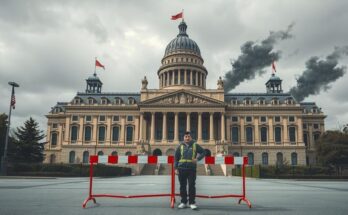Fouad Abdelmoumni, a Moroccan human rights activist, was arrested for criticizing the government during French President Macron’s visit. Prosecutors are investigating him for allegedly spreading false information, potentially leading to a five-year prison sentence. His arrest is viewed as part of a broader pattern of repression against dissenting voices in Morocco, despite improving Franco-Moroccan relations focused on economic ties.
A Moroccan economist and human rights advocate, Fouad Abdelmoumni, was detained in Casablanca following his criticism of the government during French President Emmanuel Macron’s visit. Accused of spreading false information on social media, he faces potential charges under cybercrime laws, which could lead to a five-year prison sentence. Human rights groups have condemned his arrest as a continuation of the government’s oppressive tactics against dissenters. Abdelmoumni, who has previously endured political imprisonment, voiced his claim that Morocco was “blackmailing” France through espionage and immigration cooperation during Macron’s tour of Rabat. As of now, he has not been formally charged, but legal experts anticipate serious implications following his court appearance planned for Friday. Widespread accusations of political motivation surround Abdelmoumni’s detention, especially as he was active in human rights advocacy. His attorney, Souad Brahma, criticized the arrest as an infringement on free expression and reported being denied access to the detained activist. Moroccan authorities have remained silent on allegations of politically motivated actions. During Macron’s visit, the two nations discussed enhancing their political and economic bonds, despite tense relations due to past conflicts, including alleged espionage linked to the use of Israel’s Pegasus software against activism. Morocco has categorically denied these accusations and has sought legal redress for defamation. Abdelmoumni, 66, has a long history of defending human rights, previously imprisoned during King Hassan II’s oppressive rule. He has shown ongoing support for pro-democracy movements in Morocco and protested human rights abuses. Recently, he was involved in commemorating a historical injustice, seeking justice for a Moroccan nationalist from the 1960s. While Macron’s government seems to be deepening ties with Morocco, prioritizing economic agreements, human rights issues have been conspicuously absent from his public discourse during the visit. This blend of strategic partnership with the glossing over of human rights concerns provides a complex view of France’s political maneuvering in North Africa.
The recent detention of Fouad Abdelmoumni epitomizes the challenges faced by human rights defenders in Morocco, especially in light of strained relations with France. Abdelmoumni’s arrest coincided with President Macron’s visit, during which he publicly criticized the Moroccan government. This situation mirrors ongoing tensions regarding freedom of expression in Morocco and the broader implications of international relations between Morocco and France, particularly in the context of political repression and historical grievances. Abdelmoumni’s prior experiences as a political prisoner during a notorious era of Moroccan history highlight the deeply rooted issues of government repression against dissent. The involvement of external organizations like Amnesty International has added international scrutiny to Morocco’s human rights practices, yet the country’s government has been resolute in rejecting these accusations. The background also connects to the recent controversies surrounding the use of technology such as Pegasus, showcasing how personal privacy and the methods of governance continue to jeopardize the safety of activists. This broader framework reveals the complex narratives intertwined with Abdelmoumni’s arrest and the ongoing struggle for human rights in Morocco.
The detention of Fouad Abdelmoumni underscores a troubling trend in Morocco’s treatment of human rights activists, particularly amidst improving relations with France. As the activist faces serious legal challenges for voicing his opinions, such actions reflect the broader climate of repression within the country. The juxtaposition of economic ties with a lack of accountability on human rights is a narrative that highlights the precarious balance between diplomacy and justice in international relations.
Original Source: www.voanews.com



